London Film Festival 2018 Report 3: Awards Contenders & Festival Surprises
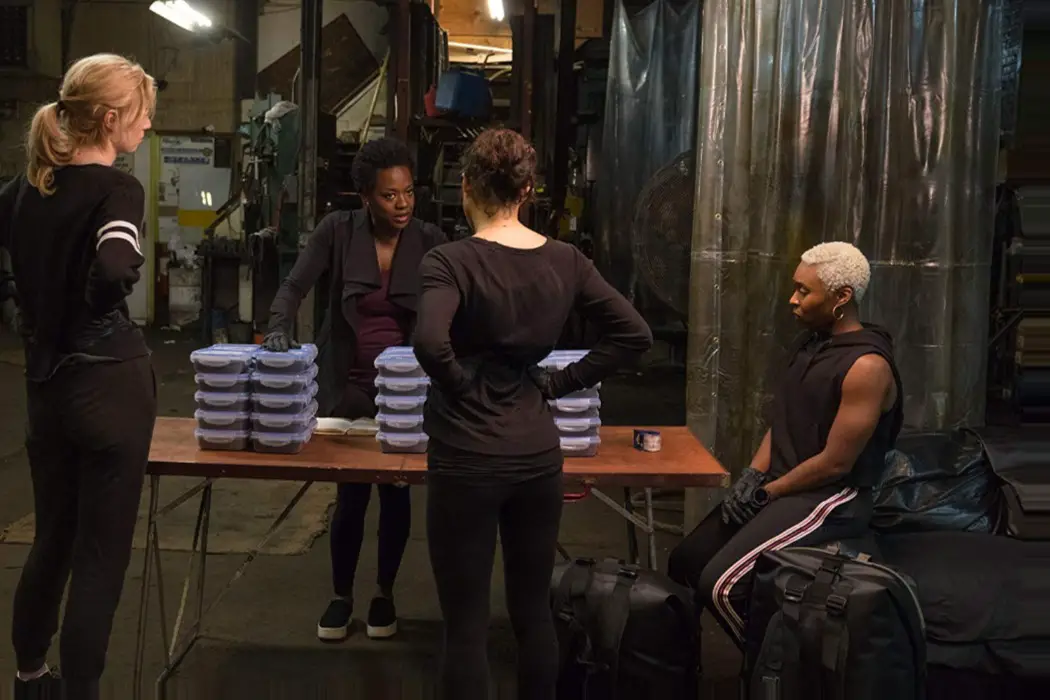
Alistair is a 25 year old writer based in Cambridge.…
London Film Festival has finally kicked off, and the Film Inquiry team are getting to see some of the most talked about films going into awards season. However, we’re still trying to keep reviews of those to a minimum, to highlight some of the most interesting films outside of the glamorous galas – come for our takes on Buster Scruggs and Widows, stay for our takes on documentaries about experimental musicians and Indian horror movies.
The Ballad of Buster Scruggs (Joel and Ethan Coen)
Gus Edgar-Chan: The Coen Brothers are back, with a high enough bodycount to make Tarantino blush. Their misanthropic, psychotropic, anthologic(al) new film is a state-spanning western, featuring six tales of differing genres, structures, and, yes, quality. Whether the rumours of The Ballad of Buster Scruggs being retooled from a botched tv series to the silver screen are true or not, it certainly feels that way – these stories are wildly uneven, ranging from the bloody good to the just plain bloody.
If there is an overarching theme to the gun-toting fables, it’s a vague sentiment that the western genre is still all well and kickin’. The storybook structure offers little more than that, but the fact that the Coens can milk so much mileage out of American frontier antics is testament enough.
Take the first ‘chapter’, for instance, in which Tim Blake Nelson’s cuddly outlaw sings his way through a series of grisly shootings. It’s a perfect opener: hilarious, macabre, and bearing a pertinent meta-textual message on the passing of time. Its only fault is that it dwarves the second, a similar, less Looney Tunes-y horseback ride through the uncanny valley.
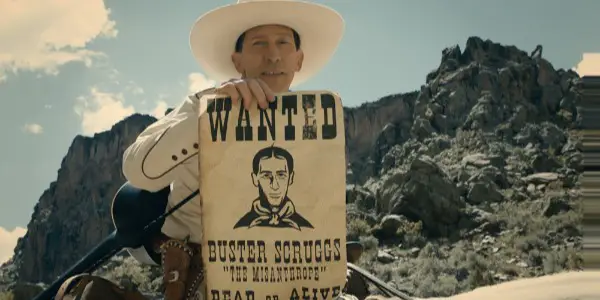
James Franco cuts a (perhaps intentionally) second-rate Clint Eastwood, all squint-eyed gurns and desert-dry sarcasm. The storyline, where Franco tries and fails to rob a bank, and is left to hang, is besides the point. It’s all about the punchline. Fair enough – it’s a fine gag – but this second story feels tonally derivative of the first.
The third, entitled ‘Meat Ticket’, goes the other way: it’s too tonally different. A suffocatingly depressing affair, Liam Neeson hauls a one-man travelling circus (its star being a quadriplegic Harry Melling) from town to town, before deciding he’s had enough. Sounds dour? That’s because it is. There’s also little point to it.
The fourth, thankfully, is lovely. A methodically-paced rumination on that running motif of the passage of time, Tom Waits’ mumbling eccentric is captivating right from the off. He pans for gold in a blissful valley, swipes eggs out of nests before guilt makes him put them back, and shouts to the night about finally getting his hands on that ore. The Coens’ nihilist tendencies are present, but they’re not all-consuming, leaving this chapter as the diamond (gold?) in the rough.
Zoe Kazan leads the fifth chapter, in which the uncertainty of her future reaches a startling close on the Oregon trail. The Coens love shaggy-dog stories, but the taut structure of the film does this conventional tale no favours. Too short for the waste of time to be satisfying, and too long for it not to be a waste of time, Kazan’s empathetic performance and an adorable puppy isn’t enough to salvage a write-off.
And then we reach our final chapter, a gothic character study in which five travellers (including a miscast Brendan Gleeson) are stuck with one another in a carriage. This one starts slow but ends terrifically, even threatening to inextricably link the five prior stories. Alas, the film remains patchy and rather disparate, but only by the Coens’ standards. At the level they’re currently at, it’s impossible for them to make a bad film. If we’re simplifying fractions, then The Ballad of Buster Scruggs is half a great one.
Bisbee ’17 (Robert Greene)
Musanna Ahmed: Robert Greene loves performance. His documentary films aren’t just documentary films; there’s always a feature within them, ultimately blurring the line between fiction and non-fiction. He’s hardly the only one to make this type of docudrama hybrid but what makes the director’s films so appealing is the subject matter he chooses. Bisbee ‘17 may be the most fascinating story Greene has… captured? Staged? Either way, Bisbee ‘17 is fascinating too because it represents a leap forward in the perfection of the filmmaker’s style.
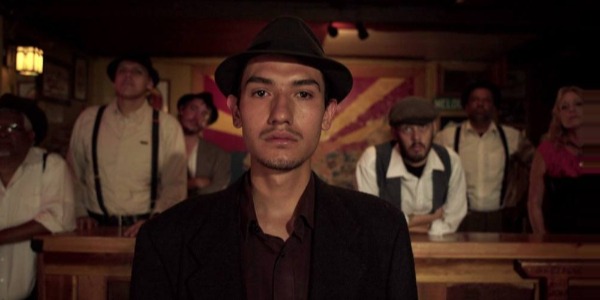
The film follows various characters in Bisbee, Arizona who commemorate the 100th anniversary of the infamous Bisbee Deportation through a large scale re-enactment of the event, which saw 1200 striking miners violently exiled from the town. It bears similarities to another doc currently circuiting festivals, The Silence of Others, with its access to individuals who were directly affected by the event and how they describe the history of the locations, particularly around the time of that fateful day. Also, like with the youths interviewed in Silence of Others, not too much about the Deportation is known by newer generations, largely due to a lack of focus in history classes nor any media coverage.
Greene’s style often involves rolling before saying action, in an attempt to capture his subjects both naturally and as “actors” for the camera after they’re given the cue to introduce themselves. This new technique in Greene’s handbook works well in a narrative following people recreating events as actors, depicting the contrast between authenticity and reproduction. It’s clear these individuals are taking part because their convictions about this story needing to be told are so strong with significant statements such as “A mining town without a mine is usually referred to as a ghost town” and “We’ve gone from literally the richest town in Arizona to the poorest.” Their final point is driven home in the final scene, which may be polarising but nevertheless thought-provoking.
Greene’s work looks slicker and more polished than ever with gorgeous compositions of his landscapes and subjects, looking less like a documentary than ever. His staging of the events in the third act is astonishing, suggesting the future of a filmmaker who can produce amazing features using the know-how gained from documentary filmmaking à la Paul Greengrass. I look forward to whatever Robert Greene does next.
Girl (Lukas Dhont)
Andrew Winter: Belgian director Lukas Dhont’s debut feature is a powerful, poignant portrait of Lara (Victor Polster), a 15-year-old trans girl with two goals in life – becoming a ballerina and undergoing the gender-confirmation surgery she needs to fully transition.
Most of the people around her – including Lara’s dad, Mathias (Arieh Worthalter) – are supportive but occasionally we see prejudice and ignorance. Inappropriate comments from her ballet teacher are followed by humiliation at a sleepover, but Girl isn’t an angry film. Rather, it’s a low-key, level-headed – almost forensic – examination of exactly what it means to grow up transgender.
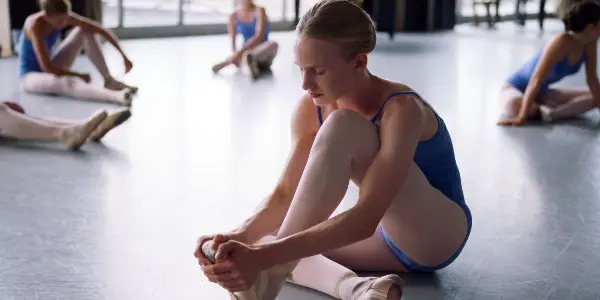
Dhont – who co-wrote the screenplay – is keen to impress upon us just how tough Lara’s journey is.
Certain reactionaries carry on as if transitioning was some kind of frivolous fad but would be quickly disabused of such notions as one of Lara’s doctors discusses potential hazards of the surgery in the bluntest detail (nothing good ever comes from the word “fistula”). Lara’s decision to hide her penis by taping it up, leaving her skin red raw, is similarly eye watering.
We discover Lara came late to ballet but still managed to make it into a top-class academy. However, getting good enough to stay there is murder on her body and it becomes clear she will eventually have to decide between pursuing the surgery or her ambition to make it as a dancer. Ballet and preparing for gender-confirmation surgery might seem odd bedfellows but Dhont cleverly compares the sheer physical and emotional toll taken upon her by both.
This is Polster’s acting debut and it’s difficult not to slip into hyperbole when talking about him. The Belgian actor isn’t trans himself which quite rightly raises questions of representation, but it’s hard to begrudge him the role when he brings such startling authenticity and fearlessness to it.
Dhont’s absolute empathy for Lara is palpable in every shot. There are moments of nudity, but these never feel intrusive or prurient, and the director contrasts the grace of her dancing with the awkwardness Lara feels in any given social situation – always at the periphery, even with friends or family.
Right before the end we glimpse her in a reflective wall panel at the hospital. Out of focus, she appears to be two different people – not at war but not in unison either. Dhont wants us to know it’s how Lara feels all the time.
Happy New Year, Colin Burstead (Ben Wheatley)
Alistair Ryder: After failing to secure the budget to get his ambitious sci-fi project Freakshift (to have starred Alicia Vikander and Armie Hammer) off the ground, Ben Wheatley has decided to go in the opposite direction, making a lowkey family drama – that’s unexpectedly one of his finest films to date. It’s a dryly comic snapshot of British working class life that feels distinctive to the director, although his biggest fans may not be as likely to get on board with it; this is his first film to dismiss his trademark penchant for violence altogether, with the closest thing to a bruising action set piece consisting of a woman tripping over a doorstep.
Colin Burstead (Neil Maskell) is organising a big New Year’s eve get together for friends and family. He’s hired a lavish country manor on the outskirts of town, but has made the mistake of letting others in his family choose which guests are coming down. Before long, ex-boyfriends and husbands of family members appear, fracturing what was supposed to be a good time for all – and Colin struggles to keep himself together as he tries to ensure there aren’t too many disruptions to his initial plan.
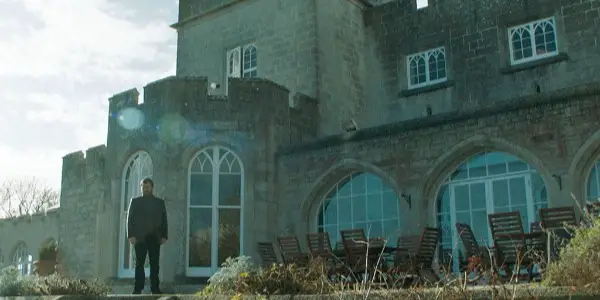
Happy New Year, Colin Burstead is a return to the very characteristically British worldview that defined Down Terrace and Sightseers, as well as being his first film set in the modern day since that 2012 effort. In a time when the only British films that document contemporary working class life are Ken Loach style social realist miserabilism, Wheatley‘s first film of the post-Brexit era feels more essential as a result. Even as the family feuds and barely holds itself together, there’s a warm, offbeat humour that softens their woes.
I suspect the reason it is premiering at London Film Festival is because of its very distinctive Britishness that would be a harder sell internationally. From obscure pop culture references (70’s comedian Norman Collier is namedropped in the first five minutes), to tense political small talk that seems beyond parody (“I voted for a Tony Benn Brexit”), the political and cultural nuances of conversations here are highly unlikely to translate overseas. Despite this, it would be a disappointment if this didn’t find an audience. The entire ensemble are on the top of their games, and seem to know each of their characters inside out – a pretty remarkable achievement considering how loosely scripted and conceived the whole endeavour is.
The old maxim is that the more fun a cast has making a film, the less fun it is to watch. Wheatley‘s latest is a notable exception to this rule – and as it’s bypassing a cinema release to debut on the BBC later this year, I can’t help but hope this inspires serialised spin offs that give us more time with the Bursteads. They may make idiotic mistakes, but with one notable exception (Sam Riley‘s excellent turn as the loathsome, quasi-loan shark ex husband), they are lovable fools who I was left wanting to spend more time with. We are in desperate need of more authentically working class voices on British screens both big and small at the moment, and this portrayal of a mismatched family unit feels like a breath of fresh air as a result.
Shut Up and Play the Piano (Philipp Jedicke)
Charlie Nicholson: Few figures are quite so representative of the 1990’s Zeitgeist as Chilly Gonzales. And as if to confirm that assumption, the composer, rapper and proponent of pretty much anything MTV might’ve winced at seeing on its weekend production schedule, opens Shut Up And Play The Piano by telling us – the fans and oddity-seekers that’ll likely form most of the filmmaker’s audience – to hate him with a virulent passion. How very…grunge.
Philipp Jedicke’s bizarre hybrid documentary reflects upon the career of Canadian musician, Jason Beck, who after gaining pop notoriety through the Berlin alternative scene during the late 90’s attained widespread acclaim for his genre-blurring classical compositions. And screaming quite loudly during a lot of very important press events. There was a good deal of that too.

Initially, disliking him doesn’t seem too difficult. Through Jedicke’s continually fidgety editing style, we jump between stagy interviews in which Beck calmly details his motivation, and grainy 90’s footage that depict the musician freestyling convulsively about c*cks with all the preemptive thought of a melting Rik Mayall.
It places us firmly in the realm of Waiting for Godot and other Guest oddities, and the peculiar reconstructions in which Gonzales – playing himself – dramatises his past recollections (in one scene encouraging his partner to scream like the falcon he is to get the creative juices flowing) don’t exactly assuage the feeling we’re watching someone toot a horn they’re never quite aware is out of tune.
What is surprising, then, is how quickly Shut up And Play The Piano cobbles the tongue-in-cheek set up into something that feels very much like sincerity. Beck‘s constant alienation, his rivalry with brother composer Christophe Beck and his very obvious gift for the piano all drive what is in places a sympathetic quest for self-actualisation – and as Jedicke hops between the “stoner haze” of Berlin’s punk nabe, the philharmonic Kaiser Quartett and his Grammy-winning collaboration with Daft Punk, there’s no denying his respect for an outsider who just wanted to express himself on his own terms, free from censorship.
Most surprising? Gonz, his story, and his characteristically zany oeuvre becomes strangely beguiling. Though Jedicke frequently skews objectivity and structure for what are effectively comedy sketches, he clearly admires the musician’s desire to entertain, and as a result it’s quite impossible not to at least keep half an ear free to hear him out.
That Time of Year (Paprika Steen)
Chloe Walker: Twenty years ago, Paprika Steen appeared in Thomas Vinterberg’s Festen – one of the standout films of the Dogme 95 moment. Centred around a feuding family gathered for the patriarch’s 60th birthday, Festen dealt with the most harrowing of subject matters: racism, suicide, child abuse.
That Time Of Year, which Steen both directs and stars in, is also set at a family gathering. This time though, things don’t get quite so dark. The conflicts at the heart of Steen’s Christmas film are of a much more quotidian nature. A child wants to return a present from his grandma. A grandfather brings his undisciplined dog to the overcrowded house. No one dares to tell their sister that her red cabbage is disgusting. Ah, there’s nothing like Christmas with the family!
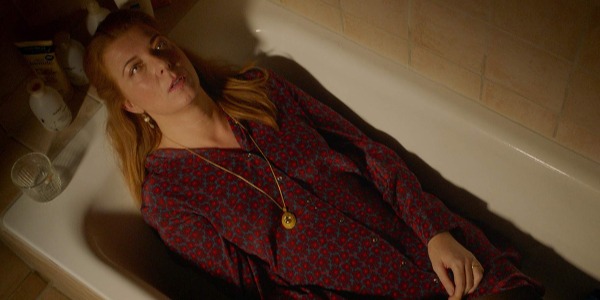
If you’ve ever convened with extended family to celebrate the holidays (and who hasn’t?), That Time Of Year will feel very familiar. Steen is excellent at portraying the various miseries these occasions can yield; the thin veil of politeness that isn’t enough to cover years of built-up resentments. There’s a purposeful claustrophobia to the whole endeavour that makes your skin itch. Too many people in too small a space is always a recipe for disaster.
Whilst Steen is certainly adept at depicting the claustrophobia, rictus grins and forced politeness that predominate family get-togethers, whether that makes for an enjoyable or worthwhile viewing experience is another matter. It’s hard to see what she’s really trying to say with That Time Of Year other than ‘Families, huh?’. The commentary doesn’t get any sharper than that, and there’s not enough humour here, or depth of characterisation, to sweeten the pill.
In a way, she’s a victim of her own success: her evocation of an excruciating family reunion is so excruciating that it’s painful to watch. One uncomfortable family gathering a year is enough for me.
Tumbbad (Rahi Anil Barve)
Alistair Ryder: Tumbbad is a labour of love over two decades in the making. Director Rahi Anil Barve wrote his first draft of the screenplay back in 1997, repeatedly returning to the project ever since – with principal cinematography initially getting completed in 2012, before the filmmaker and his producers decided to scrap the bulk of the footage and return to the drawing board. Extensive reshoots took place in 2015, and three years later, the world has finally been able to see this distinctively Indian horror story.
Alas, it’s a film that, rather than putting a regional spin on the genre outside of its historical backdrop, Tumbbad merely mirrors the worst excesses of contemporary Hollywood horrors. There are countless jump scares straight out of the James Wan school, and numerous set pieces that recall significantly greater films, ranging from the Pale Man chase sequence (and dark period setting) in Pan’s Labyrinth, to the bodily fluid grossness of Sam Raimi’s Drag Me to Hell. What we are told is a labour of love for the filmmaker winds up feeling like a cynical attempt to replicate the Blumhouse jump scare formula for Indian audiences, now that it has arrived in the wake of so many films with which it shares genre DNA.

The first act promises much more than it eventually delivers, offering an indelible mix of regional folklore, and thrills cribbed from the Guillermo Del Toro playbook. In the early 20th century, we are introduced to a family in the titular village of Tumbbad, promised a wealth of riches by their grandfather – and if this wasn’t enough, they have to look after a severely deformed great grandmother, who the children aren’t allowed to see due to her frightening appearance. We soon learn that their ancestors built a shrine to Hastar, a God who isn’t allowed to be worshipped due to his greedy manner, and that their grandmother is cursed to live in agony for eternity due to stealing some of his riches.
Fifteen years later, and the young son Vinayak (Sohum Shah) returns to the village he promised never to return to, in order to get some riches for himself, and later, even enlists his children to join him. Living deep below the Earth’s surface, Hastar carries a loincloth filled with gold at all times – and Vinayak makes a living by repeatedly making the pilgrimage to steal his wares.
The second and third chapters in this tale take place during and following the British Raj, and yet despite this prominently featuring, never adds up to anything approaching an allegory – it’s merely historic window dressing, unable to work in synergy with the fantastical elements in a way you’d expect from a Guillermo Del Toro film (the unquestionable primary influence here). The story is far more interesting in concept than execution; you can understand why this has been such a long gestating passion project for the director, it’s just hard to fathom how the final product feels so formulaic with its scares, and oddly devoid of anything more than surface level cultural insight. It’s less Tumbbad, more plain bad.
Widows (Steve McQueen)
Nathan Osborne: Breathlessly compelling and nerve-shreddingly intense, Steve McQueen’s Widows is a shatteringly great heist-thriller bound to enrapture audiences along for the mission. In arguably his most accessible, mainstream film to date, McQueen keeps us perched on the edge of our seats for the entire duration – but that doesn’t mean he relaxes in the way he so deftly infuses subtext and agency into his work.
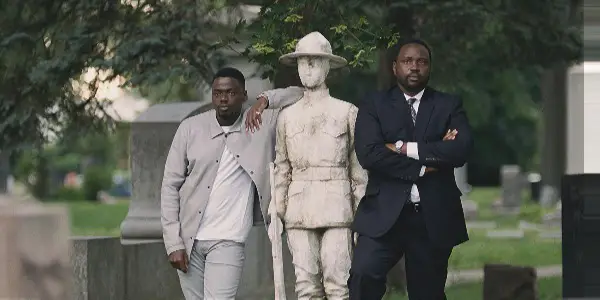
With a towering ensemble at his disposal, and Gillian Flynn’s – my favourite female writer working today – thunderous writing in tow, McQueen crafts a heist-thriller very much rooted in the here and now. Although you may be required to suspend your disbelief throughout the narrative’s relentless twists and turns, almost every development is sharply palpable, best experienced in a crowded performance venue. It’s a little more formulaic than you may be expecting, but McQueen brings his filmmaking sensibilities to fold, enriching the story with a real sense of place and female empowerment which will help set it apart within the crowded genre.
Viola Davis is as powerful as ever in her ferociously enthralling lead performance, bringing complexity and depth to the role, while Elizabeth Debicki is another of the film’s standouts, fantastically straddling a dramatic intensity with a sprinkling of humour that she so consistently nails. Daniel Kaluuya is terrifying as a henchman but would benefit from more screen time in order to clearly define and separate his character from the wider archetypes. Cynthia Ervio is a bolt of energy who profits from being introduced later in the tale, while Michelle Rodriguez proves that she’s more than the Furious franchise that shot her to stardom. This starry ensemble may very well be the year’s strongest.
Widows manages to feel like old-school filmmaking but it is fantastically contemporary in its themes and refreshing female angle. The 130-minute runtime flashes by in a brilliantly-suspenseful blast of adrenaline that will take some beating amongst the genre’s further endeavours. Steve McQueen‘s breakout in the multiplex serves him well without dulling his artistic sensibilities; this barn-burning release puts him and his tremendous cast front and centre – and given the pedigree cast and talents on display, it may be The Academy’s mainstream pick moving into award season.
In our next instalment, we’ll be getting dragged across concrete, and giving our thoughts on Peter Jackson’s new film – a 3D documentary about World War I.
Does content like this matter to you?
Become a Member and support film journalism. Unlock access to all of Film Inquiry`s great articles. Join a community of like-minded readers who are passionate about cinema - get access to our private members Network, give back to independent filmmakers, and more.
Alistair is a 25 year old writer based in Cambridge. He has been writing about film since the start of 2014, and in addition to Film Inquiry, regularly contributes to Gay Essential and The Digital Fix, with additional bylines in Film Stories, the BFI and Vague Visages. Because of his work for Film Inquiry, he is a recognised member of GALECA, the Gay & Lesbian Entertainment Critics' Association.













